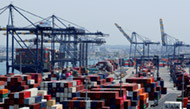Federal analysts reported recently that the oil market has produced a bonanza for Iraq, which has the third-largest reserves in the world. The report, by the Government Accountability Office, said that from 2005 to the end of this year, Iraq is expected to have earned at least $156 billion in oil revenues and amassed a budget surplus that could go as high as $79 billion. Roughly $29 billion of that surplus is piling up in Iraqi banks as well as in a fund at the Federal Reserve Bank of New York that was supposed to be used for Iraqi development.
In truth, Iraqis have had little incentive to spend their own money given the willingness of the United States Congress to keep writing blank checks for President Bush’s disastrous adventure there. Congress has appropriated $48 billion for rebuilding in Iraq since 2003 and committed all but $6 billion of that amount, mostly for oil, electricity, water and security projects.
By contrast, between 2005 and 2007, when all that oil revenue was piling up, only $3.9 billion of Iraq’s budget went to reconstruction. An even tinier amount went to maintaining United States and Iraqi-financed projects like roads, bridges, buildings, water and electrical installations. That raises serious questions about the wisdom of making those capital investments in the first place if they are not going to be properly tended.
One of the Bush administration’s most damaging postinvasion decisions is at the heart of this problem. In its illconsidered dismissal of everybody who had any connection to Saddam Hussein’s Baath Party, American overseers depleted the ranks of Iraqi bureaucrats who had the skills and experience to run an oil-producing country of about 27 million people.
As the Congressional investigators found, Iraq now lacks the trained professionals to prepare and execute budgets and to solicit, award and oversee capital projects. The United States must redouble its efforts to help Iraq build this capacity, including bringing back skilled Iraqis who have fled the country.
Congress is finally losing patience with the indefensible image of Americans paying historic high gasoline prices while Iraq pockets huge profits and Americans underwrite Iraq’s rebuilding. Like Democrat Carl Levin and Republican John Warner, members of the Senate Armed Services Committee, we question the Pentagon’s decision to spend $33 million from an emergency fund on an economic zone at Baghdad International Airport. Iraq has committed $44.8 million to the project but should pay for the whole thing.
It is good - for Iraq and for the world economy - that Iraq is getting back into the oil business. But it still has a long way to go before it fully assumes responsibility for itself and its future. That must include spending its own money for its own enormous and unfulfilled reconstruction needs.
스마터리빙
more [ 건강]
[ 건강]이제 혈관 건강도 챙기자!
[현대해운]우리 눈에 보이지 않기 때문에 혈관 건강을 챙기는 것은 결코 쉽지 않은데요. 여러분은 혈관 건강을 유지하기 위해 어떤 노력을 하시나요?
 [ 건강]
[ 건강]내 몸이 건강해지는 과일궁합
 [ 라이프]
[ 라이프]벌레야 물럿거라! 천연 해충제 만들기
 [ 건강]
[ 건강]혈압 낮추는데 좋은 식품
[현대해운]혈관 건강은 주로 노화가 진행되면서 지켜야 할 문제라고 인식되어 왔습니다. 최근 생활 패턴과 식생활의 변화로 혈관의 노화 진행이 빨라지고
사람·사람들
more많이 본 기사
- 美, EU 전 집행위원 등 5명 입국금지… “미국 빅테크 표현 검열”
- 뚜레쥬르, 뉴욕 맨해튼에 직영 ‘매디슨 스퀘어 파크점’ 열어
- ‘헉’ 오바마케어 보험료가 연 4만불… 3
- “트럼프 행정부, 스페이스X에 동물보호구역 토지 양도 검토”
- 허위조작정보근절법, 與주도 처리될듯…텅빈 본회의장 밤샘 필버
- 경찰, ‘통일교 로비 의혹’ 한학자·윤영호 오늘 2차 접견조사
- [건강포커스] “모든 니코틴은 심혈관 독소…청소년 중독 방지 대책 시급”
- 대법원 “최종심 나올 때까지 시카고에… 1
- 과거 임기 제한 주장했던 동영상 논란
- 탁 트인 전망과 불꽃놀이로 즐기는 PALMS CASINO RESORT의 올인클루시브 2026 새해 맞이
- 트럼프, GDP 호조에도 “금리 내려야…동의못하면 연준의장 안돼”
- 델라웨어 차량등록국서 총격…州경찰관 1명 사망
- ‘마약 혐의’ 남양유업 창업주 외손녀 황하나 경찰에 체포
- 조지아서 역주행 승용차 덮쳐 한인 등 2명 사망
- 법무부, 엡스타인 자료 추가 공개… “전용기에 트럼프 8번 타”
- 법무부, ‘반자동 소총 금지’ 워싱턴DC 상대 소송… “위헌”
- “ATM기 사용하기 겁나네”
- 美, 카리브해로 특수부대 전개…베네수 작전 개시 임박했나
- 46회째 1등 안나온 파워볼 복권…당첨금 약 16억 달러로 껑충
- 미주한인경찰협회, 지역 고교생 4명에 장학금 전달
- 임윤아, 여우 주연상 쾌거.. “멋진 상 감사합니다”
- 박나래, 논란 또 추가..이번엔 ‘나혼산’ 조작 방송 의혹
- 해외서도 극과극 반응’대홍수’, 넷플릭스 글로벌 1위 차지”SF 걸작 vs 최악”
- AI로 가속화되는 노동시장 개편
- ICE 홈디포 급습 한인 체포
- ‘크리스마스 캐롤’과 산타 클로스 1
- ‘차량 링거’ 전현무 의료법 위반 고발당해… “적법한 진료” 해명
- 연말 여행객 최다… LAX 공항 ‘대혼잡’
- 가족 얼굴 못 알아보고 성격 변한 부모님… “서양 기준으론 정상?”
- 1,480원까지 돌파한 환율… “내년에도 고공 행진”
- 한인 박찬영씨 교통시비 총격 사망...타코마중앙장로교회 40대 장로, 19일 레이시 도로서 참변
- 9세 영 아티스트 박리하 ‘2026 LA 아트쇼’ 참가
- ‘올해는 ICE 이민자 체포 광풍의 해’
- 이영지 맞아? 러블리 분위기 물씬..180도 달라진 ‘뼈말라’ 몸매
- [정재민의 미디어풍경] 적과의 동침, 협력하며 경쟁하기
- 잃어버린 피부감각 되찾아준다… 유방재건, 의외의 효과
- 공정위, 대한항공 마일리지 통합안 보완명령
- 베네수엘라 봉쇄에 금·은 값 또 최고
- 이번엔 ‘먹는 비만약’ 경쟁…알약 위고비, 미국서 판매 승인
- 에어프랑스 엔진 화재 5천피트 급강하 ‘아찔’
- 中과 무역갈등 휴전한 美 “中반도체 추가관세 18개월간 보류”
- ‘연방하원 도전장’ 척 박 예비후보 후원모임
- 2명에 모두 7,500달러 장학금
- 올해 워싱턴DC 식당 92곳 폐업…‘역대 최다’
- 이하늬, 기획사 미등록 혐의 검찰 송치.. “10월 정식 등록”
- 송성문, 메디컬테스트에 초긴장 “혹시 뭐 나올까 걱정했다→미국 열심히 갔는데 맨손으로 돌아올까봐”
- [새해 강화되는 노동법] 가주서 노동… 1
- [화요칼럼] 단호박의 온기
- 연말 ‘로드레이지’ 비극… 한인 총격 피살
- 워너브러더스 주주 “파라마운트 인수안 여전히 불충분”
1/5지식톡

-
 미 육군 사관학교 West Poin…
0
미 육군 사관학교 West Poin…
0https://youtu.be/SxD8cEhNV6Q연락처:wpkapca@gmail.comJohn Choi: 714-716-6414West Point 합격증을 받으셨나요?미 육군사관학교 West Point 학부모 모…
-
 ☝️해외에서도 가능한 한국어 선생님…
0
☝️해외에서도 가능한 한국어 선생님…
0이 영상 하나면 충분합니다!♥️상담신청문의♥️☝️ 문의 폭주로 '선착순 상담'만 진행합니다.☎️ : 02-6213-9094✨카카오톡ID : @GOODEDU77 (@골뱅이 꼭 붙여주셔야합니다…
-
 테슬라 자동차 시트커버 장착
0
테슬라 자동차 시트커버 장착
0테슬라 시트커버, 사놓고 아직 못 씌우셨죠?장착이 생각보다 쉽지 않습니다.20년 경력 전문가에게 맡기세요 — 깔끔하고 딱 맞게 장착해드립니다!장착비용:앞좌석: $40뒷좌석: $60앞·뒷좌석 …
-
 식당용 부탄가스
0
식당용 부탄가스
0식당용 부탄가스 홀세일 합니다 로스앤젤레스 다운타운 픽업 가능 안녕 하세요?강아지 & 고양이 모든 애완동물 / 반려동물 식품 & 모든 애완동물/반려동물 관련 제품들 전문적으로 홀세일/취급하는 회사 입니다 100% …
-
 ACSL 국제 컴퓨터 과학 대회, …
0
ACSL 국제 컴퓨터 과학 대회, …
0웹사이트 : www.eduspot.co.kr 카카오톡 상담하기 : https://pf.kakao.com/_BEQWxb블로그 : https://blog.naver.com/eduspotmain안녕하세요, 에듀스팟입니다…
케이타운 1번가
오피니언
 조환동 / 편집기획국장·경제부장
조환동 / 편집기획국장·경제부장 AI로 가속화되는 노동시장 개편
 민경훈 논설위원
민경훈 논설위원‘크리스마스 캐롤’과 산타 클로스
 정재민 KAIST 문술미래전략 대학원 교수
정재민 KAIST 문술미래전략 대학원 교수 [정재민의 미디어풍경] 적과의 동침, 협력하며 경쟁하기
 김영화 수필가
김영화 수필가 [화요칼럼] 단호박의 온기
 김정곤 / 서울경제 논설위원
김정곤 / 서울경제 논설위원[만화경] 안중근의사 유해봉환 사업
 권지숙
권지숙 오후에 피다
 옥세철 논설위원
옥세철 논설위원말살되고 있는 유럽의 성탄절 전통, 그 원인은…

외로운 이웃들
 조지 F·윌 워싱턴포스트 칼럼니스트
조지 F·윌 워싱턴포스트 칼럼니스트 [조지 F. 윌 칼럼] MIT에 대한 트럼프의 무분별한 공격
1/3지사별 뉴스

‘연방하원 도전장’ 척 박 예비후보 후원모임
연방하원에 도전장을 낸 척 박(한국명 박영철) 예비후보 후원 모임이 지난 18일 열렸다. 척 박의 부친인 박윤용 뉴욕주하원 25선거구 (민주)…
‘경찰 무력사용지침 갱신 의무화’ 입법 초읽기

‘올해는 ICE 이민자 체포 광풍의 해’
올 한해동안 버지니아와 메릴랜드, DC 등에서 연방 이민당국에 체포된 사람이 1만명이 훌쩍 넘는 것으로 조사됐다. 또 미 전국적으로는 22만명…
“ATM기 사용하기 겁나네”

연말 ‘로드레이지’ 비극… 한인 총격 피살
연말을 맞아 도로 위에서 순간적으로 벌어진 운전 중 시비가 40대 한인 가장의 총격 피살 비극으로 이어졌다. 워싱턴주 레이시 경찰국과 서스턴 …
엡스타인 파일 공개 다음날 트럼프 사진 삭제…야당서 탄핵 경고

오늘 하루 이 창 열지 않음 닫기 





















































.png)


댓글 안에 당신의 성숙함도 담아 주세요.
'오늘의 한마디'는 기사에 대하여 자신의 생각을 말하고 남의 생각을 들으며 서로 다양한 의견을 나누는 공간입니다. 그러나 간혹 불건전한 내용을 올리시는 분들이 계셔서 건전한 인터넷문화 정착을 위해 아래와 같은 운영원칙을 적용합니다.
자체 모니터링을 통해 아래에 해당하는 내용이 포함된 댓글이 발견되면 예고없이 삭제 조치를 하겠습니다.
불건전한 댓글을 올리거나, 이름에 비속어 및 상대방의 불쾌감을 주는 단어를 사용, 유명인 또는 특정 일반인을 사칭하는 경우 이용에 대한 차단 제재를 받을 수 있습니다. 차단될 경우, 일주일간 댓글을 달수 없게 됩니다.
명예훼손, 개인정보 유출, 욕설 등 법률에 위반되는 댓글은 관계 법령에 의거 민형사상 처벌을 받을 수 있으니 이용에 주의를 부탁드립니다.
Close
x